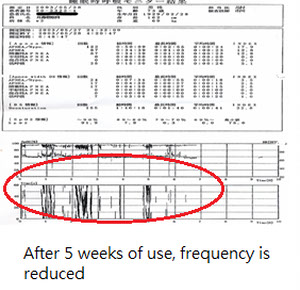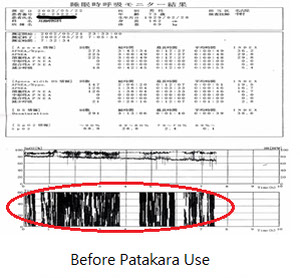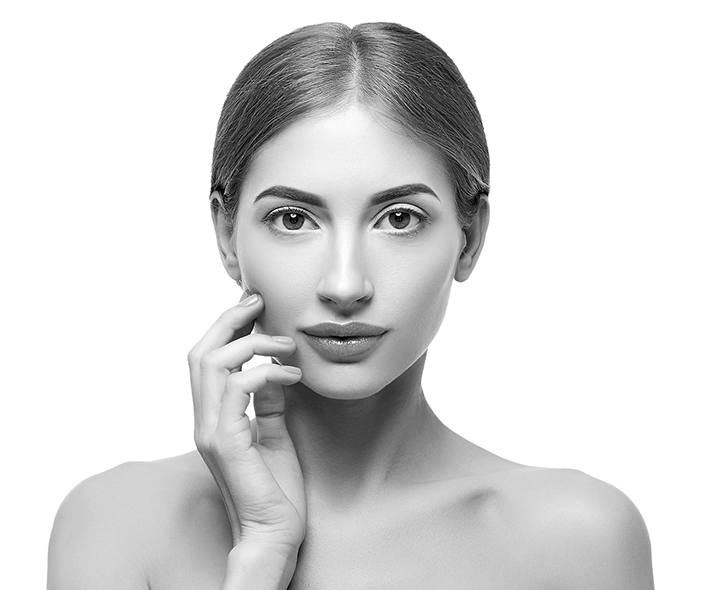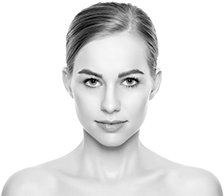

This is the report of a 70 year old male patient who accepted occlusive sleep apnea examination. 11 months ago, the patient was worried that he may have sleep apnea and wanted to know his sleeping state, so he accepted a 3 day 2 nights examination at the hospital. The result showed that he has sleep apnea and the doctor recommended him to use n-CPP treatment. As he was unable to sleep well by wearing the equipment while sleeping, he gave up in the end. Like this, he escaped for about 1 year.
As he was still worried about his condition, he went to consult with the doctor again. The doctor changed his recommendation to using sleep print and introduced to him a dentist. Consequently, as he has a jaw with no teeth, he was also unable to wear the sleep print. He transferred to see Dr. Hosokawa in the end. Dr. Hosokawa recommended him to use Patakara. After 5 weeks of using Patakara by chance, he underwent the 3 day 2 nights examination again as recommended by the doctor 1 year ago. The examination result is shown in the after use diagram. The stop time of sleep apnea and blood oxygen content can be seen from the examination result, which showed that both conditions improved evidently.
It was ten years ago when I was diagnosed with high blood pressure. It was often on the way to deliver goods that I felt my neck's tendons tighten and then I get a headache. Sometimes I get dizzy when I stand to work. After gotten diagnosed with high blood pressure, I started to take anti-hypertensive medication. My normal systolic blood pressure is 200mmHg, diastolic blood pressure is 120mmHg and when I have a headache, my systolic blood pressure will sometimes reach 250mmHg. It was about five or six years ago when my chest suddenly became tight, my pulse stopped and other symptoms of arrhythmia emerged. After having taken medication, the tightening of my chest improved but the stopping of my pulse still occurred. Due to the instability of my heart condition, the doctor was unwilling to perform my cataract surgery, which caused my cataract to deteriorate continuously. In the end, the things that I could see turned out to look like being wrapped in a layer of white film.
It was at the end of Heisei 11th year when my dentist and friend told me: "There is a device that improves snoring with great results" and recommended me to use it. My snoring condition is extremely serious. One time when I was hospitalised due to dizziness, another patient who shared the same room as me objected that my snoring was too loud, causing that patient not being able to sleep, so I had to change to an individual room. After starting to use Patakara, apart from using it 2-3 minutes each time every morning, midday and night, I will find the time to use it more, so I use it about 5-6 times a day.
When I first started using it, the areas around my mouth felt sore but I adapted to it after a period of time. When doing Patakara exercise, I will also have a towel handy, as the saliva will sometimes flow out.
I used Patakara hoping to improve my snoring. I did not think that the earliest show of effect turned out to be arrhythmia and high blood pressure. When I returned to the hospital to undergo routine check for my high blood pressure and arrhythmia after two months of using Patakara, the doctor told me that I no longer have arrhythmia and high blood pressure, and that I no longer need to take medication. I also felt that not having taken any medication, my chest pain and pulse stopping no longer occurred. And my blood pressure also became systolic blood pressure 130mmHg, diastolic blood pressure 100mmHg and I also no longer had headaches or felt dizzy. As my blood pressure was well under control, the doctor decided to perform my cataract surgery.
My family told me that during my use of Patakara for about 3 months, my snoring sound substantially became smaller and respiratory arrest no longer occurred. And I was most surprised that I used to have to get up to go to the toilet 4-5 times in the middle of night has now become twice.
My condition is a variety of symptoms mixed together. The doctor said that to target a particular symptom to do individual treatment is not easy. However, it was after doing Patakara exercise that various symptoms seemed to start going in the right direction. In future, I will continue to use Patakara to maintain my health that I had just managed to get back.
The aging of the tongue muscle groups caused this madam's snoring. When the tongue and muscles that support the tongue age, the root of the tongue will sink up to the respiratory tract, causing the respiratory tract to become narrow when lying on your back to sleep. This way, it will hinder the air entering the body, which is prone to snoring. Apart from exercising the muscles around the mouth, Patakara exercise also exercises the tongue and muscles that support the tongue. This way, it can enhance your lip closing strength, which prevents the sinking of the tongue while sleeping to improve snoring.
Sleep apnea is the same as snoring. It is also due to the sinking of the tongue up to the respiratory tract, which causes brief respiratory arrest. Sleep apnea will cause reducing of the blood oxygen content and become one of the reasons for causing arrhythmia, cardiovascular disease, diabetes, high blood pressure and brain stroke. The use of Patakara exercise to stop the sinking of the tongue can avoid these dangers.
It beginning of March in 2001 when I saw Ms. Susaki whom I have not seen for ages. I remember that it was Heisei 11th year at the end of December when I saw this madam for the first time. Her facial complexion was dull, her face was swollen and her skin had no tension like a dead person's face, which left an extremely strong impression on me. I was shocked again when I saw her this time, as her facial complexion was different compared to before. Her facial complexion was better and her skin became firm. She looked so radiant.
She said that she recently did not have to get up in the middle of the night to go to the toilet; her head does not hurt when she gets up and her family told her that they also do not hear her snoring sound now. She smiled and said: "Due to throbbing in the past, I feel unwell when chasing after my grandson not even for three steps. I can now run 30m no problem," left a profound impression on me. In regards to her suffering from all kinds of problems caused by sleep apnea in the second half of her life, this madam said: "I did not think that my body could still recover to my current health condition."
A story of a sleep apnea patient
Susaki Mitiko (64 years old)
Distressing dizziness
and headache
Dentist recommendations
High blood pressure
and Arrhythmia disappeared after two months
Reduced frequency
of going to the toilet in the middle of the night
Dr. Akihiro's recommendations
Before Patakara Use
After 5 weeks of use,
frequency is reduced
Sleep Apnea - before and after
Legal Notice / Terms and Conditions / Privacy Policy / Cookie Policy
© 2017- 2026 Patakara.eu - Official Patakara Distributor. All Rights Reserved.
ADDITIONAL INFORMATION
SHOPPING



